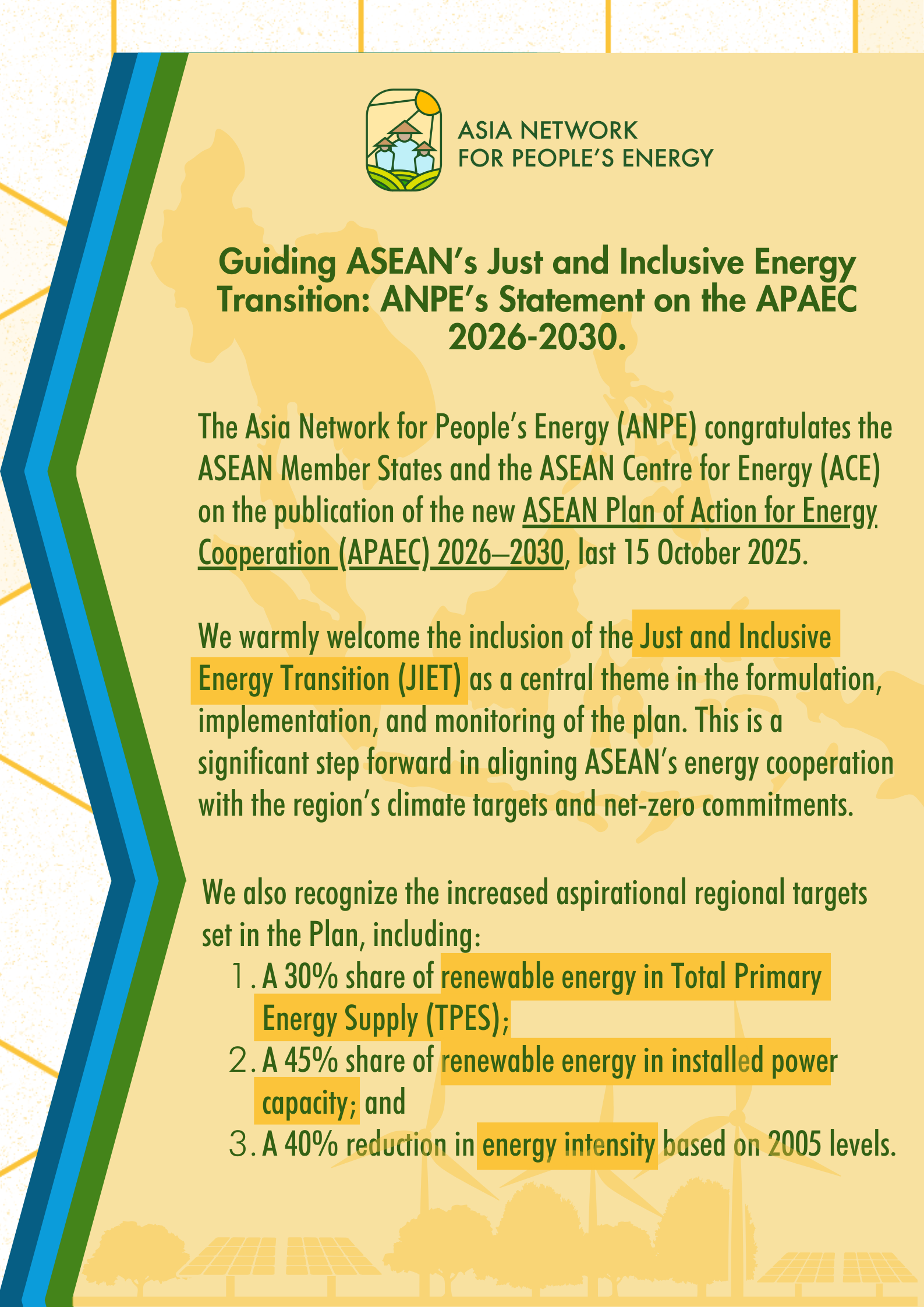- Version
- Download 0
- File Size 120.45 KB
- File Count 1
- Create Date November 28, 2025
- Last Updated November 28, 2025
The Asia Network for People’s Energy (ANPE) congratulates the ASEAN Member States and the ASEAN Centre for Energy (ACE) on the publication of the new ASEAN Plan of Action for Energy Cooperation (APAEC) 2026–2030 last 15 October 2025.
We warmly welcome the inclusion of the Just and Inclusive Energy Transition (JIET) as a central theme in the formulation, implementation, and monitoring of the plan. We commend the integration of JIET as a strategic priority, supported by outcome-based strategies and action plans under the Regional Energy Policy and Planning Programme Area. This is a significant step forward in aligning ASEAN’s energy cooperation with the region’s climate targets and net-zero commitments.
We also recognize the increased aspirational regional targets set in the plan, including:
- A 30% share of renewable energy in Total Primary Energy Supply (TPES);
- A 45% share of renewable energy in installed power capacity; and
- A 40% reduction in energy intensity based on 2005 levels.
Furthermore, we laud the plan’s commitment to integrating Gender Equality, Disability, and Social Inclusion (GEDSI) into its energy policy and planning, reinforcing the importance of an inclusive and equitable energy transition. We also appreciate the ACE’s efforts to ensure multi-stakeholder consultations throughout the development of the APAEC, reflecting the aspirations of both state and non-state actors across the region.
As the APAEC 2026–2030 moves into its implementation phase, the civil society members of the ANPE and its partners and allies, respectfully reiterate the following recommendations:
- Ensure transparent, substantial, and meaningful participation of Indigenous Peoples, impacted communities, youth, persons with disabilities, women, , and other marginalized groups in the implementation and monitoring of the APAEC.
- Ensure that the free, prior, and informed consent (FPIC) process to move beyond compliance, thus, treated as a critical mandatory mechanism to ensure full respect for the collective rights of Indigenous Peoples to their lands, territories, and resources, and their right to determine their own development needs throughout the entire project cycle, including assessment, design, planning, implementation, and monitoring.
- Prioritize energy security and equitable access, addressing persistent gender disparities in the energy sector through a transformative, gender-just energy transition.
- Enable financial institutions and investors to scale up and accelerate the redirection of finance away from fossil fuels toward clean and sustainable renewable energy, and support for community-led sustainable renewable energy solutions.
- Strengthen safeguards, transparency, and accountability in the implementation of the APAEC 2026-2030, particularly in the governance of transition minerals extraction and infrastructure development. The APAEC 2026-2030 must also be socialized with the ASEAN Minerals Cooperation Action Plan (AMCAP) 2026-2030.
- Avoid reliance on false solutions, such as unproven or unsustainable technologies, and instead prioritize community-based, decentralized renewable energy systems to meet ASEAN’s energy and climate goals.
- Develop and implement a clear strategy to transition away from fossil fuels across the region, aligned with the principles of a just, equitable, and inclusive energy transition.
Finally, ANPE looks forward to continued collaboration with the ASEAN and ACE in the implementation and monitoring of the APAEC 2026–2030. We emphasize the importance of cooperation, knowledge sharing, capacity development, and inclusive governance, and reaffirm our commitment to supporting a truly just, gender-inclusive, and climate-aligned energy future for the region.
